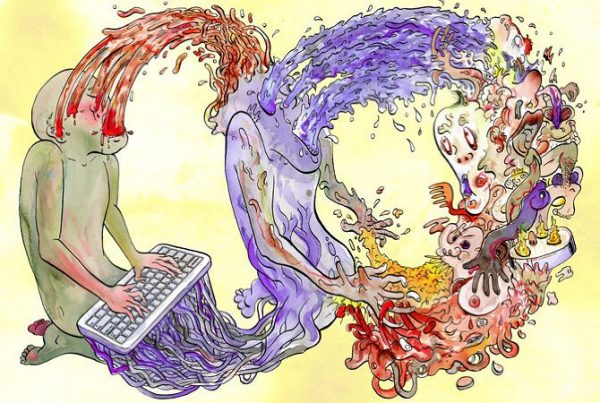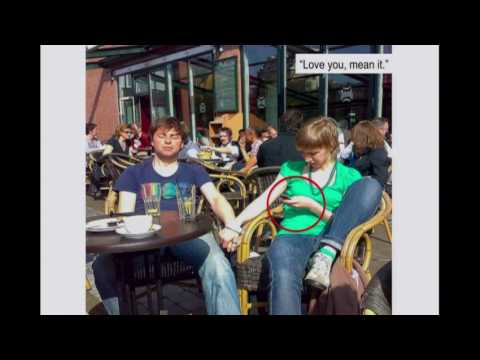
I came across this brilliant TED talk by Renny Gleeson a few weeks back and it made me very thoughtful about how our social environment has changed over the years. Due to technology & social networks many of us are no longer inside our relationships but outside looking in. No doubt this would have occurred in the past but now technology & the environment support us in viewing/sharing our relationships rather than enjoying & participating in them. Check out Renny’s talk & let me know in the comments how you feel about his perspective. Its funny & enjoyable to watch whilst making a statement about our technological social life.
Maybe we are living the geek’s version of being social and in relationship? As you know a high percentage of geeks are intraverted???? So we may now be living an introverted extroversion???? See an old post of mine that was published in the book Blog08 extrovert and introvert matches.
Ambient intimacy
I love the term ambient intimacy which is so brilliant for evoking our social intimacy through technology. In her blog Disambiguity Leisa Reichelt defines the term:
Ambient intimacy is about being able to keep in touch with people with a level of regularity and intimacy that you wouldn’t usually have access to, because time and space conspire to make it impossible. Flickr lets me see what friends are eating for lunch, how they’ve redecorated their bedroom, their latest haircut. Twitter tells me when they’re hungry, what technology is currently frustrating them, who they’re having drinks with tonight. Knowing these details creates intimacy. (It also saves a lot of time when you finally do get to catchup with these people in real life!) It’s not so much about meaning, it’s just about being in touch.
Through Renny’s blog I discovered Jonathan Harris’s site and his insights speak directly to my soul. I loved his exhibition in New York‘s Museum for Modern Art for Valentine’s Day 2008 titled I Want You To Want Me using data from online dating sites. Love the image of the Matchmaker below (seeing as I am a human Matchmaker) – but the whole work spoke to me:
Maybe these needs cannot be answered online and require physical contact in all cases, but my sense is that they can, if only we design the right worlds to encourage and support them. Some such worlds probably exist already (indeed, the web is so vast that one can find examples of just about anything), but even if they do exist, they have not become widespread, and the predominate thrust of today’s web is not around satisfying these needs. Today’s web feels more like one giant cocktail party, full of chatter, gossip, and he said, she said.
Matchmaker big are you in or out?
He has some words of wisdom in on his site Jonathan Harris that touched me deeply that I would like to share here:
As we fill in the same boxes, answer the same questions, and express ourselves in the same generic ways, we might think this convergence of identity is a good thing, leading to some kind of global unity or mass empathy. But true empathy comes not from forcing people all to be the same, but from helping people to appreciate their differences. Our online tools do a great job at breadth (hundreds of friends, thousands of tweets), but a bad job at depth. We live increasingly superficial lives, reducing our relationships to caricatures and our personalities to billboards, as we speed along at 1,000 miles an hour. We trade self-reflection for busyness, gorging ourselves on it and drowning in it, without recognizing the violence of that busyness, which we perpetrate against ourselves and at our peril.
For the last 100 years—from letters, to phones, to faxes, to emails, to chats, to texts, to tweets— communication has been getting shorter and faster, but we are approaching a terminal velocity. I doubt there is a shorter means of communication than the tweet, unless we start to make monosyllabic grunts at each other or communicate silently, brain to brain. Brief gestures of communication can be beautiful, but can also be shallow. So what will happen next? Will we stop at the tweet, or will we bounce back in the other direction, suddenly craving more depth? I’d bet on the latter.

How do you feel about our new style of relating now?
In his blog Ouroboros post Brain Belches and Sentience, Renny sums up the potential for the future technological experience:
It feels inevitable that a status update will someday generate a reaction – “feeling blue” may generate a skype call from an unknown (but somehow familiar soothing) voice, suggesting you “look on the bright side – you’ve got that Mexico trip coming up! You’ll be tan and happy, and you’ll probably hook up!” – and when the line goes dead, you’ll feel great, and maybe slightly, momentarily unsettled. But you shouldn’t be – you put the trip into dopplr, booked it through Expedia, and you’ve got a profile that matches someone else who did the same (and is single)…weather.com predicts sun for the 10-day forecast, and the tweets you posted from Tulum the last time were, algorithmically speaking, the happiest of your 8,956 posts.
How do you feel about our new style of relating now? Let me know in the comments below.